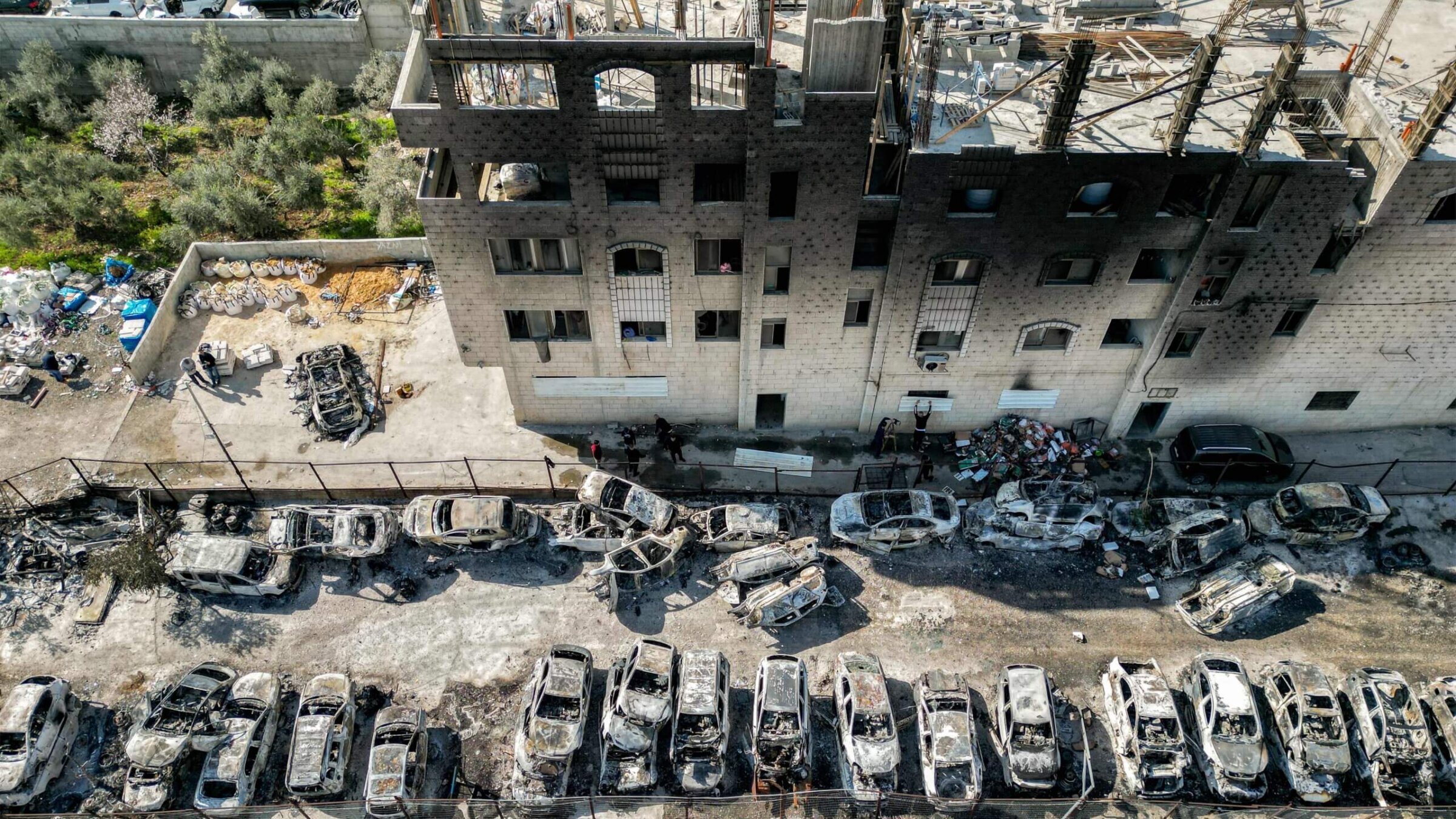As an Israeli settler, I know our country is far from perfect. Outrage alone won’t change reality
Despite violence in Israel, we cannot stop working toward a better future

This picture taken on February 27, 2023 shows an aerial view of a scrapyard where cars were torched overnight, in the Palestinian town of Huwara near Nablus in the occupied West Bank. – Two Israelis living in the Har Bracha settlement near Nablus were killed on February 26 in a “Palestinian terror attack”, officials said, sparking violence in which a Palestinian man was killed, while settlers torched homes in revenge. Photo by Ronaldo Schemidt/AFP via Getty Images
MITZPE YERICHO — Over the last few days, following terrible violence in Judea and Samaria, Jews have been in a state of shock over the behavior of their fellow Jews. They’ve responded with handwringing, condemnations and outrage.
I empathize with these feelings. But for my own sanity, I have chosen to focus on a more productive end.
Zionism was a utopian movement designed to create a state in which Jews would not only be protected from the antisemitic dangers of the non-Jewish world, but would flourish and fulfill the prophet’s vision of being a light unto the nations.
It was a lofty vision that Jews have spent nearly a century putting into practice. But those who experience Israel on a daily basis know it is far away.
The state of Israel and its people are plagued with trauma and tragedy. Much of the hurt we experience, Jew and Arab alike, is self-inflicted: We often avoid taking necessary steps against terrorists out of fear of international criticism, or avoid the difficulty of negotiating with one another when we can make things better. Division, fighting and suffering could be so easily avoided. But it almost seems we are addicted to it.
As anyone who lives here can tell you, Israel is far from perfect. But for some reason, many assume that a country of over 6 million Jews wouldn’t suffer from the societal ills that plague every other nation in the world.
I’m not sure if their erroneous assumptions stem from naivety or a sense of Jewish supremacy, but it’s completely absurd. The utopian Israel that was fantasized about by early Zionists is in reality a nation like all others.
People are always surprised when they discover that there are prisons in Israel with Jews in them. They’re shocked to hear that there is a prison in Israel just for Jewish murderers, and that it’s full. They automatically assume these people must’ve killed Arabs as part of the Israeli-Palestinian conflict. They become truly disheartened to hear that Israel also has Jewish murderers who kill other Jews. Israel also has drug issues, organized crime, and juvenile delinquents. The Israeli police and courts deal with the same common corruption as other nations.
When people act shocked by Jewish criminal and immoral behavior, especially in Israel, disowning the criminals as not true Jews or Zionists, who do they think they’re fooling? Why wouldn’t Jews have criminals, deviants and violent extremists? Do these people think that Jews are somehow inherently better than non-Jews? Why the false outrage and shock when Jews act immorally? Jews are embarrassed by these people, and they clearly aren’t following Jewish values. But they’re just as Jewish and Zionist as any law-abiding citizen of Israel.
As much as one might be offended by their neighbor’s lifestyle choices or ignoring traditional Jewish values they hold dear, their neighbor is probably just as offended by other people’s ignoring other traditional Jewish values that they’ve decided to keep themselves.
Many argue that holding Jews and Israel to a higher standard than other nations is antisemitic. Ironically, Jews often hold themselves to a higher, and even a double standard, and don’t see anything wrong with doing so. Jews expect each other to act better than other nations, and especially better than our enemies.
Shmuel Hakatan, a scholar quoted frequently in the Talmud, taught, “Do not rejoice when your enemies fall, and do not let your heart be glad when they stumble, or else the Lord will see it and be displeased and turn away his anger from them.” A well-known midrash ruled the joyous Hallel prayer isn’t recited on the last day of Passover because that was the day the Egyptians drowned in the sea (when it split for the Jews). When God’s creations drown in the sea, it isn’t a time to rejoice. Even though Egyptians were trying to kill the Jews when they died, it isn’t proper for the Jews to rejoice.
While many Palestinians celebrated Sunday’s slaughter of two innocent Jews, we of course should not stoop to their level. But we also should not be so surprised when our fellow Jews cannot live up to our own ideals, and respond to violence with even more violence.
What will it take to move away from the disappointments of the current Jewish state and people and move closer to the utopian vision of Zionism’s founders? I don’t have the answers to those questions — yet. But I know that’s where I’ll be focusing my energy and effort moving forward.
To contact the author, email [email protected]

















